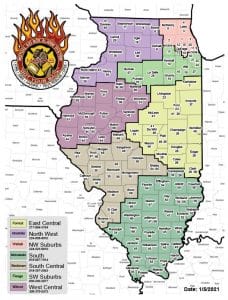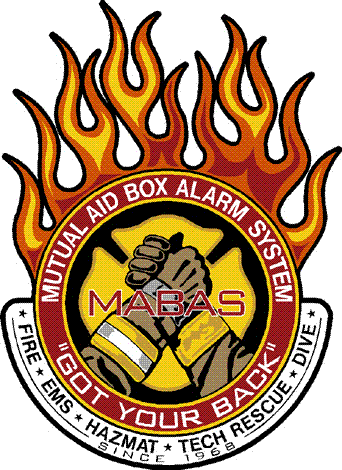What Is MABAS?
 What is MABAS
What is MABAS
MABAS (Mutual Aid Box Alarm System) in partnership with IEMA (Illinois Emergency Management Agency) has established a statewide, non-discriminatory mutual aid response system for fire, EMS, and specialized incident operational teams. Sharing the effort are representatives from the Office of the State Fire Marshal, Department of Public Health – EMS Division, and Illinois Fire Chiefs Association. The system defines a resource response plan to any location within the state when the Governor orders a Declaration of Disaster. A Memorandum of Understanding was signed on January 16, 2001, and updated in 2006, a first in Illinois fire service history.
MABAS has also become a Partner Agency with Cook County’s Department of Homeland Emergency Management & Regional Security. Together, MABAS and CCDEMRS designs and establishes capability-based systems to serve the high-density, urban area.
Historically, IEMA has had the capability through state resources and assets to support disaster-stricken communities in many areas except Fire, EMS, Technical Rescue, Urban Search and Rescue, Water Rescue & Recovery, and Hazardous Materials Operations Teams. Illinois resources like the State Police, Department of Transportation, and numerous other assets are able to mobilize under the direction of the Governor in response to a disaster. Illinois does not own fire departments, EMS ambulances, or specialized operations teams – substantial “system” resources within the control of the state are lacking. The plan provides a system of “one-stop shopping” for IEMA officials to activate and mobilize local municipal fire, EMS, and special operations assets through MABAS.
Statewide mutual aid systems have been in existence since the late 1960s. Pre-September 11th, MABAS was heavily rooted throughout northern Illinois. Since September 11th, MABAS has rapidly grown throughout Illinois, Wisconsin, Indiana, Michigan, and parts of Iowa and Missouri. Day-to-day MABAS extra alarms are designed to provide the fast response of emergency resources to communities during ongoing emergencies.
 What can MABAS provide?
What can MABAS provide?
MABAS offers 40 specialized operations teams for hazardous materials, 15 underwater rescue/recovery, 39 technical rescue teams, and a state-sponsored urban search and rescue team. Certified fire investigators, Incident Management Team members, and fleet support mechanics can be “packaged” as mobile support teams providing assistance with large-scale incidents requiring complicated and time-consuming efforts beyond the capabilities of most agencies.
Every MABAS participant agency has signed the same contract with their 1,100 plus counterpart MABAS agencies. MABAS agencies agree to: standards of operation, incident command, minimal equipment staffing, fireground safety, and on-scene terminology. MABAS agencies are able to work together seamlessly on any emergency scene. All MABAS agencies operate on a common radio frequency (IFERN) and are activated for response through pre-designed “run” cards each participating agency designs and tailors to meet their local risk need. MABAS also provides mutual aid station coverage to a stricken community when their fire/EMS resources are committed to an incident for an extended period.
MABAS responds to over 800 local extra-alarm incidents annually throughout the 69 divisions of Illinois. When the Governor mobilizes state assets under the direction of IEMA via a Declaration of Disaster, Fire, EMS, and special operations resources can be mobilized as state assets. As a state asset, resources mobilized are afforded liability, reimbursements, and workman’s compensation coverages. Further, any and all costs beyond normal operations experienced by fire, EMS, and special operations will be reimbursed by the State of Illinois through IEMA. To assure clarity, reimbursement for an IEMA-directed mutual aid resource might include overtime related to the incident, an off duty personnel recall to maintain levels of service which were reduced due to the response, expendables, consumables, and damage to mutual aid provided equipment directly related to the Declaration of Disaster.
Illinois faces many challenges from natural, manmade, and technological threats to citizen safety. Every community now has the newest threat of disaster to deal with: domestic terrorism. The delivery of a weapon of mass destruction will certainly tax the entire state’s resources. MABAS is working with numerous other state, federal, and local agencies through IEMA’s coordination to prepare for meta-disasters from earthquakes to improvised nuclear devices.
When Chicago’s LaSalle Bank Building caught fire, twenty-two (22) fire agencies were activated via MABAS to fill in at City of Chicago fire stations to maintain continuity of emergency service. EMS MABAS responses to the City of Chicago, MABAS Division 9, have occurred during mass casualty events related to marathons, Metra and subway train crashes, electrical system failures, and other system surges damaging service levels.
MABAS has been activated on many occasions by IEMA for emergency declarations since 2001. The responses include the Tamara train derailment, Roanoke tornado, Utica and Harrisburg tornado disasters, and Louisiana Hurricanes Katrina, Gustav, and Ike response and recovery effort through an EMAC activation.

